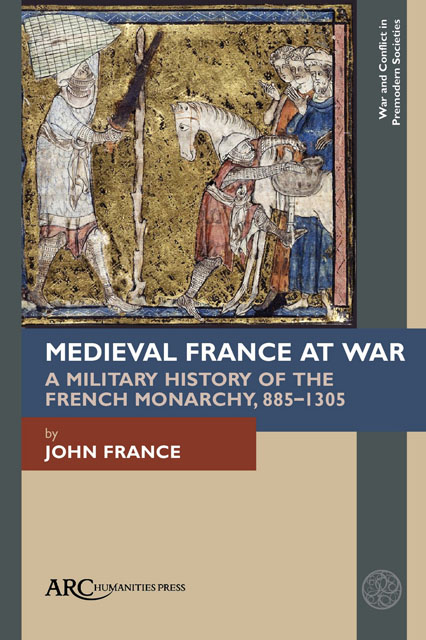Book contents
- Frontmatter
- Contents
- List of Illustrations
- Preface
- Introduction
- Chapter 1 Technology and Warfare
- Chapter 2 The Emergence Of France
- Chapter 3 French Monarchical Power in Context
- Chapter 4 Warfare In France To 1066
- Chapter 5 A Clash Of Dynasties 1066– 1180
- Chapter 6 Philip Ii and The Rise of France
- Chapter 7 The Expansion of France
- Chapter 8 Louis Ix and The Apogee Of French Power
- Chapter 9 The Problems Of Power
- Chapter 10 Perspectives on The Army of The Kings of France
- Bibliography
- Appendix: A Note on Sources
- Index
Chapter 8 - Louis Ix and The Apogee Of French Power
Published online by Cambridge University Press: 06 April 2023
- Frontmatter
- Contents
- List of Illustrations
- Preface
- Introduction
- Chapter 1 Technology and Warfare
- Chapter 2 The Emergence Of France
- Chapter 3 French Monarchical Power in Context
- Chapter 4 Warfare In France To 1066
- Chapter 5 A Clash Of Dynasties 1066– 1180
- Chapter 6 Philip Ii and The Rise of France
- Chapter 7 The Expansion of France
- Chapter 8 Louis Ix and The Apogee Of French Power
- Chapter 9 The Problems Of Power
- Chapter 10 Perspectives on The Army of The Kings of France
- Bibliography
- Appendix: A Note on Sources
- Index
Summary
The Early Reign
THE EARLY DEATH of Louis VIII in 1226 led to a regency by his very able wife, Blanche of Castile, for his young son, Louis IX (1226– 1270). The absence of an adult male successor inevitably opened the way to aristocratic factional struggle for influence over the young king— what Barthélemy has called the “fronde des barons.” Peter Mauclerc, duke of Brittany, and Philip Hurepel of Boulogne were both of Capetian stock; they and Theobald IV of Champagne were the primary forces in this internal conflict. Mauclerc was a special threat because his duchy had once been held of the Plantagenets, and Henry III was anxious to profit from internal struggles in France. All the competitors had different objectives, however. In 1226 Mauclerc rebelled, but submitted when the queen bought him off and raised a strong army, which she deployed into the Touraine to curb Hugh of Lusignan’s contacts with Henry III. Henry strove to raise an army, but his agents made a truce to last into 1228. In 1228, in alliance with Hurepel, Mauclerc kidnapped the child Louis IX. The militias of the towns of the Île de France rescued Louis. Louis cherished this memory, as John of Joinville, writing in the early fourteenth century, recalled of his journey back to Paris: “The roads had been thronged with people, armed and unarmed, all calling on our Lord to grant their young king a long and happy life and guard him from his enemies.” Mauclerc was again in rebellion in 1230, however, supported by discontented barons of Poitou and a major army led by Henry III. Henry had gathered an army in 1229, but there were insufficient ships to transport them across, and he and Mauclerc agreed to put the expedition off.
In 1230 Henry again raised an English army and landed at St. Malo. His force was perhaps smaller than intended because, before leaving, he sent 160 ships home. He set out for Nantes, where his army delayed. He probably knew that the French were in great difficulty. Theobald of Champagne was a major force whose influence on the regency, and boundary disputes with others, had inflamed tensions, especially with Hurepel, the count of Flanders, and the duke of Burgundy.
- Type
- Chapter
- Information
- Medieval France at WarA Military History of the French Monarchy, 885-1305, pp. 165 - 188Publisher: Amsterdam University PressPrint publication year: 2022



